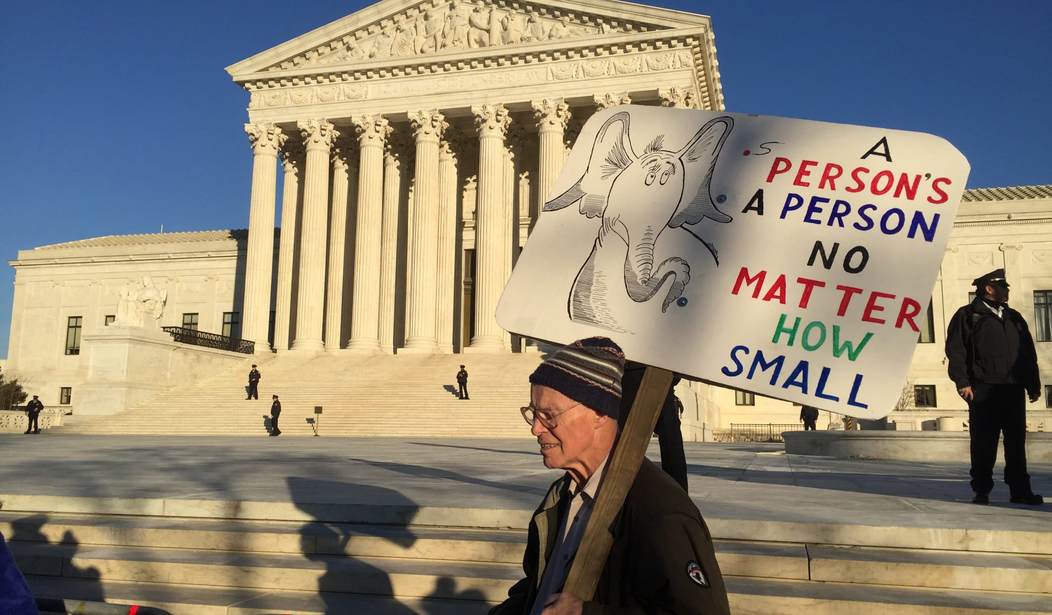On Thursday, more than 200 members of Congress — 205 Republicans and two Democrats — asked the Supreme Court to reconsider the “unworkable” supposed “right to abortion” in Roe v. Wade (1973) and subsequent cases. They filed a brief in the upcoming abortion case June Medical Services v. Gee.
In the brief, the congressmen argued that the current case “illustrates the unworkability of the ‘right to abortion’ found in Roe v. Wade, 410 U.S. 113 (1973) and the need for the Court to again take up the issue of whether Roe and Casey should be reconsidered and, if appropriate, overruled.”
June Medical Services v. Gee centers on the question of whether Louisiana’s law requiring abortion clinic surgeons to have visiting privileges at a local hospital is overly restrictive of a woman’s right to an abortion under Roe. Yet the case also considers whether or not an abortion clinic can represent its patients in court. The congressmen presented two arguments: abortion clinics cannot represent their patients because that would be a conflict of interest, and the “right to abortion” is unworkable and must be reconsidered.
As for the first argument, Louisiana’s law aims to protect the health and safety of women seeking abortions. Many abortion clinics operate with substandard care — as infamously illustrated in the case of Kermit Gosnell’s “House of Horrors.” If abortion clinics are arguing against standards to hold them accountable and protect women, they should not be able to represent those women in court.
“There is an inherent conflict of interest between abortion providers and their patients regarding state health and safety regulations,” the congressmen wrote.
The second argument proved more controversial. These Republicans and Democrats suggested that various courts’ “herculean struggles in this area” of the law illustrate the unworkability of Roe v. Wade.
“Stare decisis is not an ‘inexorable command,’ much less a constitutional principle. Instead, it is a prudential and pragmatic judgment,” they wrote, citing Planned Parenthood v. Casey (1992), a key decision following Roe. “The Court has exercised that judgment to overrule precedent in over 230 cases throughout its history. Forty-six years after Roe was decided, it remains a radically unsettled precedent: two of the seven Justices who originally joined the majority subsequently repudiated it in whole or in part, and virtually every abortion decision since has been closely divided.”
Yet the congressmen’s attack on Roe became even more damning. They wrote that “Roe’s jurisprudence has been haphazard from the beginning,” noting that the actual case did not hold that abortion was a “fundamental” constitutional right. The Supreme Court’s original limits on abortion laws were far less stringent in Roe than they would be in later cases.
“After two decades of inconsistency, the Court officially disavowed ‘fundamental right’ status for abortion and strict scrutiny review, adopting instead an ‘undue burden’ test in Casey,” the congressmen added. Even Casey did not settle the “undue burden’ standard, however. “As a result, consistency and predictability continue to be undermined as federal courts struggle to apply the Roe/Casey standard.”
“In sum, Roe’s jurisprudence has been characterized by Delphic confusion and protean change,” the legislators argued, citing many reversals and confusing legal precedents. “As the Court pulled away from Roe, the States moved forward to regulate abortion to the maximum extent allowed to protect the ‘state interests’ permitted in Roe, Casey and Gonzales. These incessant retrenchments show that Roe has been substantially undermined by subsequent authority, a principal factor the Court considers when deciding whether to overrule precedent.”
“Casey clearly did not settle the abortion issue, and it is time for the Court to take it up again,” the congressmen argued.
Two-hundred and seven members of Congress wrote the brief — 39 senators and 168 House members representing 38 states. While most are Republicans, two Democrats joined the effort — Dan Lipinski of Illinois and Collin Peterson of Minnesota.
Some outlets focused on the fact that all senators behind the brief are Republicans.
39 Republican senators sign amicus brief asking SCOTUS to consider overturning *Roe v. Wade & Casey.*
Brief calls the right to abortion in Roe unworkable.https://t.co/wtJbew38fc via @GregStohr pic.twitter.com/PULQhUCcKF
— Steven Dennis (@StevenTDennis) January 2, 2020
This led Joe Biden, the former vice president and current 2020 Democratic frontrunner, to condemn the letter as one more attempt to undermine “a woman’s constitutional right to choose.”
“Donald Trump stacked the Supreme Court with justices to try to overturn Roe v. Wade—and now Republicans are seizing the opportunity to restrict a woman’s constitutional right to choose. We have to fight these attacks and ensure this choice remains between a woman and her doctor,” Biden tweeted.
Donald Trump stacked the Supreme Court with justices to try to overturn Roe v. Wade—and now Republicans are seizing the opportunity to restrict a woman's constitutional right to choose. We have to fight these attacks and ensure this choice remains between a woman and her doctor. https://t.co/5goWP2Bkuv
— Joe Biden (Text Join to 30330) (@JoeBiden) January 3, 2020
While President Donald Trump is outspokenly pro-life, he chooses judges based on the judicial philosophy of originalism — upholding the plain meaning of the Constitution. Roe v. Wade trampled on that plain meaning by creating a new “right” to abortion that the Founders — and the authors of the 14th Amendment — did not mean to create and would have opposed.
It is high time the Supreme Court returns this issue to the rightful branch to consider it — Congress. Doing so requires the reversal of Roe v. Wade, which has undermined the people’s will and produced confusing law.
Follow Tyler O’Neil, the author of this article, on Twitter at @Tyler2ONeil.









Join the conversation as a VIP Member